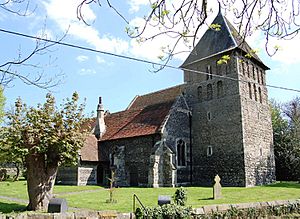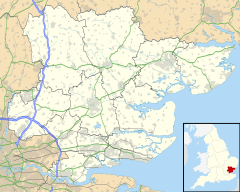Corringham, Essex facts for kids
Quick facts for kids Corringham |
|
|---|---|
 St Mary the Virgin Church, Corringham |
|
| Population | 8,884 (2001) |
| OS grid reference | TQ708832 |
| Unitary authority | |
| Ceremonial county | |
| Region | |
| Country | England |
| Sovereign state | United Kingdom |
| Post town | STANFORD-LE-HOPE |
| Postcode district | SS17 |
| Dialling code | 01375 |
| Police | Essex |
| Fire | Essex |
| Ambulance | East of England |
| EU Parliament | East of England |
| UK Parliament |
|
Corringham is a town in Thurrock, England. It's located right next to Stanford-le-Hope. The town is about 24 miles (39 km) east of London. Corringham sits on a small hill, giving it a view over the River Thames. It's also part of a Church of England parish. The town has a long history. Its main church, St Mary the Virgin Church, Corringham, dates back to Saxon times in the 7th century. Corringham used to have its own special railway, the Corringham Light Railway. This railway helped connect a factory to the main railway line. Today, the town is easy to reach, being close to the A13 road.
Contents
Exploring Corringham's Past
Ancient Tools and Settlements
In 1970, people found old tools near the former railway station. These tools were from the Mesolithic period. This means they are from the Middle Stone Age. It shows that people lived here a very long time ago.
Saxon Beginnings
It's thought that a Saxon chief named Curra settled here. This happened after Roman soldiers left the area. By the 7th century, Corringham was a Saxon community. St Cedd, who started a monastery in Tilbury in AD 653, might have built a church here too. The last Saxon leader of Corringham was Sigar in 1066. The Domesday Book of 1086 mentions him.
What Does "Corringham" Mean?
The name 'Corringham' first appeared in the Domesday Book in 1086. It was written as Currincham. Later, in 1204, it was called Curingeham. The name means 'the village of Curra's people'.
St Mary the Virgin Church
St Mary the Virgin Church, Corringham is very old. It has parts from the Saxon period. You can see special stonework in the walls. The church tower is also likely Saxon. In the 7th century, a wooden church stood here. Around the 9th century, Vikings raided Corringham. Because of this, the church was made stronger. Its walls were built to be three feet thick.
Normans and New Owners
After the Normans invaded England in 1066, Corringham came under their rule. Bishop Odo of London owned the land. Around 1100, the church was rebuilt. The west tower was added then. Inside the church, you can see a carving of a Norman man. It might be a picture of Bishop Odo. The Baud Family also became landowners in Corringham. They came from Germany with William the Conqueror in 1066.
Riverside Connections
Corringham is near the marshes and the River Thames. This meant it was always connected to trade and shipping. An old path still exists today. It goes from the coast, through the cemetery, and past the Bull Inn. It then continues towards Hadleigh Castle.
Local Government
Corringham is part of the Stanford East and Corringham Town area. This area is used for local elections. In 1936, Corringham became part of Thurrock.
Population Facts
In 1931, the population of Corringham was 1,897 people.
Schools in Corringham
- Ortu Corringham Primary School, Herd Lane
- Giffards Primary School, Queen Elizabeth Drive
- Graham James Primary School, The Sorrells
- Ortu Gable Hall School, Southend Road. This school specializes in performing arts.
Sports and Fun
Corringham used to have a football club called East Thurrock United F.C.. They played at Rookery Hill. The club closed down in 2023.
Famous People from Corringham
- Mark-Anthony Turnage – a composer (someone who writes music)
- Michael Stanley – a Samoan international rugby player. He went to Gable Hall School.
- Denise Van Outen – an actress, singer, and TV presenter.
- Rylan Clark-Neal – a TV presenter, reality TV star, and singer.
 | Selma Burke |
 | Pauline Powell Burns |
 | Frederick J. Brown |
 | Robert Blackburn |


